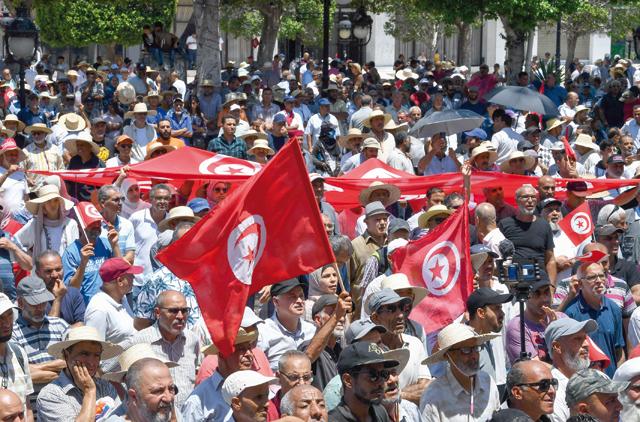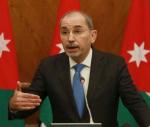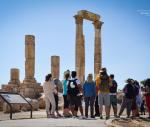You are here
UN, Western envoys urge Tunisia to restore judicial watchdog
By AFP - Feb 08,2022 - Last updated at Feb 08,2022

Members of the Tunisian security forces stand outside the closed headquarters of Tunisia’s Supreme Judicial Council in the capital Tunis on Monday (AFP photo)
TUNIS — Tunisian President Kais Saied faced growing pressure on Tuesday from judges, the UN and world powers after he scrapped a key judicial watchdog, triggering renewed accusations he is moving towards authoritarian rule.
Saied dissolved the Supreme Judicial Council on Sunday, months after sacking the government and seizing wide-reaching powers in the North African country, often lauded as the only democracy to emerge from the 2011 Arab revolts.
The former law professor had long inveighed against the council, accusing members of blocking investigations into the 2013 assassinations of leftist political figures Chokri Belaid and Mohamed Brahmi.
He had also accused his nemesis, the Islamist-inspired Ennahdha Party that had played a central role in Tunisian politics for the decade between the revolution and Saied’s power grab, of infiltrating the body.
The president, who has put fighting corruption at the heart of his programme, insisted on Monday that he would “never interfere with the judiciary” and that removing the judicial council was necessary as Tunisians wanted the country “cleansed”.
But his removal of the council, set up in 2016 to shield judges from government influence, sparked renewed anger from critics who say he is installing a new dictatorship, 11 years after the fall of dictator Zine Al Abidine Ben Ali.
Those fears have been fuelled by the increasing use of military courts to try civilians.
In Tunis, the envoys of the G-7 nations and the European Union said they were “deeply concerned” about Saied’s move against the council, “whose mission is to ensure the sound functioning of the justice system and respect for its independence”.
“A transparent, independent and efficient judiciary and the separation of powers are essential for a functioning democracy that serves its people,” they said.
Amnesty International said Saied’s “attack” on the body was “a grave threat to fair trial rights”.
“If the president enacts a decree to dissolve or suspend the institution, it will sound the death knell for judicial independence in the country,” said the rights group’s Regional Director Heba Morayef.
‘Flagrant violation’
That came hours after Washington — which has often given Saied the benefit of the doubt following similar moves — also voiced its concern, calling an independent judiciary “a core element of an effective and transparent democracy”.
“It is essential that the government of Tunisia holds its commitments to respect the independence of the judiciary, as stipulated in the constitution,” said State Department spokesman Ned Price.
A month after his July 25 power grab, Saied had given himself new powers effectively allowing him to rule by decree and suspending parts of the 2014 constitution — a document he has since vowed to replace.
His latest move gets rid of a body that had been mandated to ensure the functioning of justice, keep the judiciary independent and appoint judges.
On Monday, police blocked access to the council’s headquarters, preventing members and staff from entering.
The body’s president Youssef Bouzakher called the move “illegal”, and on Tuesday the Association of Tunisian Magistrates said it was “a flagrant violation of the separation of powers” that would be ensured in a “democratic regime”.
The association also announced a judges’ strike “at all courts across the country on Wednesday and Thursday” as well as a protest outside the council’s offices on Thursday.
‘Stifling dissent’
Ennahdha said Saied’s decision showed he was “trying to take control of the judicial apparatus to use it to eliminate his political rivals”.
Saied’s move also sparked criticism from the UN in Geneva, where High Commissioner for Human Rights Michelle Bachelet called it “a big step in the wrong direction”.
Dissolving the body “is in clear violation of Tunisia’s obligations under international human rights law”, she said.
She also pointed out that the judicial council’s establishment in 2016 had been seen as a major advance for the rule of law, separation of powers and the independence of the judiciary in Tunisia.
Bachelet also decried online hate campaigns and threats directed at the council’s members, and called for all necessary measures to be taken to ensure their safety.
She said that since July, “there have been increasing attempts to stifle dissent, including through harassment of civil society actors”.
Related Articles
TUNIS — Tunisian President Kais Saied on Sunday dissolved a top independent judicial watchdog accusing it of bias, the latest controversial
TUNIS — Hundreds demonstrated on Sunday in Tunisia’s capital against a planned referendum on constitutional changes and President Kais Saied
TUNIS — Tunisian judges on Wednesday started a widely observed nationwide strike, days after President Kais Saied announced he would dissolv

















